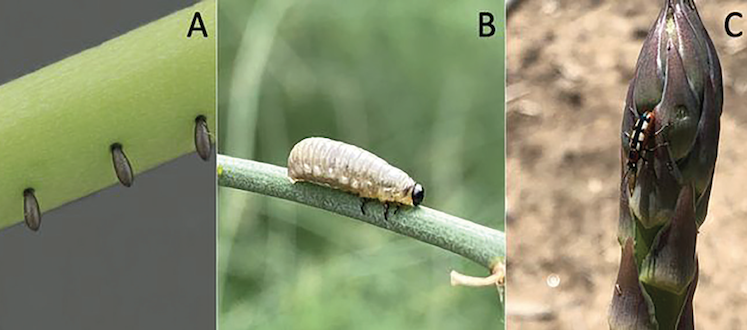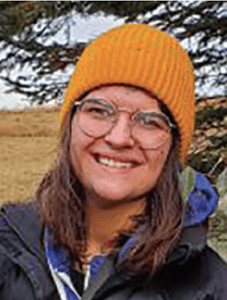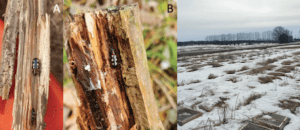

Feb 3, 2021Asparagus beetles thrive in stalks and leaf cover
Asparagus beetles are endemic to asparagus fields. The beetles emerge in the spring and growers spray for them. After spraying, the beetles keep coming back, but from where? Where do asparagus beetles overwinter?
“We used to think in the woodlots and field borders,” said Jennifer Zavalnitskaya, researcher in Michigan State University’s (MSU) Department of Entomology. New MSU research confirms some beetles do overwinter in these areas but also found most asparagus beetles overwinter in the asparagus fields.


Beetle numbers emerging from adjacent woodlots were one-tenth and beetle numbers emerging from field borders one-twentieth of the number emerging from within fields. The research also found the type of ground cover in the fields has a big impact on how many beetles survive the winter.
Zavalnitskaya presented the research findings at the recent Great Lakes Fruit, Vegetable & Farm Market EXPO, which was held virtually.
Researchers studied decomposing ground covers including tree branches, asparagus stalks, large and small pieces of tree bark and leaf litter from both coniferous and deciduous trees.
Deciduous leaves and asparagus stalks were found to be the shelters which most promoted the beetles’ overwinter survival. The more asparagus stalks in the field and the more cover from deciduous leaves, the more beetles survived to emerge in the spring.
“Beetles didn’t survive well in tree bark and coniferous leaves,” Zavalnitskaya said. “Beetles survived in higher numbers in deciduous leaves.”
Researchers also counted the number of beetles in dead bark to see if beetles preferred dead trees and they did not. Live trees produce more leaf litter and more beetles.
The obvious solution of cutting down the deciduous trees isn’t a good one because the trees provide habitat for asparagus beetle predators.
Asparagus beetles typically go through two life cycles per season.
Beetles emerge from overwintering sites in the spring and lay eggs on the asparagus spears during harvest season. This reduces spear quality. “It’s extremely difficult to remove the eggs at harvest,” Zavalnitskaya said.
The eggs eventually hatch and the larvae feed on the fern. These larvae produce the next generation of adults that lay the eggs that hatch in late summer. This generation’s larvae also feed on the fern. Fern feeding can reduce stand longevity.


The adult beetles from the last generation seek out overwintering sites when the weather turns cold and the hollow asparagus stalks are the preferred site.
“Stalks are a big source of overwintering beetles, so it’s really important to chop the stalks up early in the fall,” Zavalnitskaya said. By the time the weather turns cold, the beetles are already moving to overwintering sites.
“Most beetles overwinter in your field,” Zavalnitskaya said. “In terms of management, where are there a lot of deciduous trees and where are those leaves ending up?” The areas with lots of leaf piles are the areas to watch next spring.
The research also evaluated the effectiveness of several conventional and organic insecticides compared to a full rate and a half rate of carbaryl against asparagus beetles. All products evaluated had a 24-hour, preharvest interval (PHI).
Coragen and Entrust were found to be as effective as a half rate of carbaryl for controlling adult beetles during harvest. Permethrin and neem oil were less effective.
— Dean Peterson, VGN correspondent














